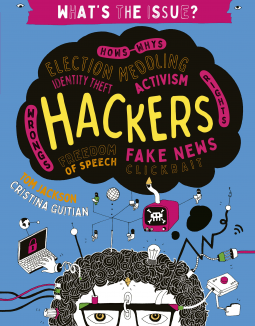
Hackers
Hows-Whys - Election Meddling - Identity Theft - Activism - Wrongs-Rights - Freedom of Speech - Fake News - Clickbait
by Tom Jackson
This title was previously available on NetGalley and is now archived.
Send NetGalley books directly to your Kindle or Kindle app
1
To read on a Kindle or Kindle app, please add kindle@netgalley.com as an approved email address to receive files in your Amazon account. Click here for step-by-step instructions.
2
Also find your Kindle email address within your Amazon account, and enter it here.
Pub Date 15 Oct 2019 | Archive Date 21 Nov 2019
Quarto Publishing Group - QEB | words & pictures
Talking about this book? Use #Hackers #NetGalley. More hashtag tips!
Description
Should states be allowed access to all communications? What level of privacy should an individual expect? Who owns the Internet? In this fascinating starting point to understanding the wider subject of the Internet and Internet safety, explore these questions through topics like:
- Spying
- Encryption
- Security
- Hacking techniques
- Cyber warfare
- Cryptocurrencies
- The Dark Web
Marketing Plan
Key Selling Points: A new series which covers current topics and events which are relevant to today's youth. Question Time promotes critical thinking and debate giving its teen readers the tools they need to formulate their own informed opinions and viewpoints. With fun illustrations, Question Time approaches each topic from every angle, providing the reader with a full picture of the subject being discussed.
Publicity: Pitch to homeschool media Mainstream media with “AI and hacker” angle Trade & Consumer: Social media: tee up for International Ask a Question Day (March 14 every year)
School Library: Promote at School & Library shows Submit for all eligible awards Teacher guide: how to ask a question Buzzfeed-y bookmark with “tips” on how to ask questions and engage
Available Editions
| EDITION | Other Format |
| ISBN | 9780711244580 |
| PRICE | US$16.95 (USD) |
| PAGES | 96 |
Average rating from 2 members
Featured Reviews
I read this book with my 10 year old son who is very much in to coding, programming etc. We both really enjoyed the book and both learned some new things. I felt that the book had the right mix of explaining facts in a fun way. The history of coding and hacking was made enjoyable and interesting for both my Son and me. It was an easy read that we could just dip in and out of when we had the chance. Reading this book inspired my Son to try to write his own code that he asked me and his dad to try and break. I think the age range this is aimed at is right and the contents were explained at the correct level. I'd definitely buy this book for my Son and any others his age that were interested in this sort of topic.
 Reviewer 531923
Reviewer 531923
I love the way this series helps teenagers to make an informed opinion about big questions raised by the developments in our society.
The book makes a distinction between more expert users/ enthusiast of the digital world and malicious meddlers. It is packed with information, but my favourite parts are thought-provoking questions for discussion e.g. When does it make sence to use secrecy and when might it be a good idea to keep things public? Is all communication equal or are some messages more important? Whose responsibility is it to keep your computer safe?
The topics range from social engineering, hacker culture, net neutrality, attention economy to identity crime, fake news and even gene hacking. The author doesn't shy away from discussing difficult issues and does it in a sensitive way. The book won't give simple answers, but will make you think through a variety of issues related to hacking, communication and online security. as well as what is there in store for us in the future.
Thank you to NetGalley and QEB Publishing for the review copy provided in exchange for an honest opinion.



